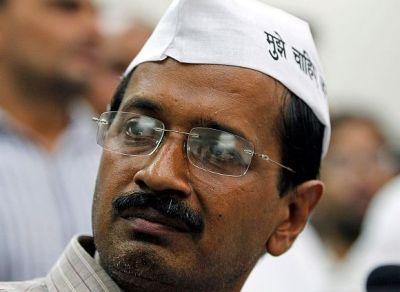 Aam Aadmi Party chief Arvind Kejriwal's jail stay was extended till June 6 on Friday as he remained adamant on not furnishing bail bond in a criminal defamation case against him by the Bharatiya Janata Party leader Nitin Gadkari, with a Delhi court chiding him for "legal illiteracy" and asking him to be "sensible".
Aam Aadmi Party chief Arvind Kejriwal's jail stay was extended till June 6 on Friday as he remained adamant on not furnishing bail bond in a criminal defamation case against him by the Bharatiya Janata Party leader Nitin Gadkari, with a Delhi court chiding him for "legal illiteracy" and asking him to be "sensible".
Metropolitan Magistrate Gomati Manocha remanded the former Delhi chief minister, who was produced in a packed courtroom from Tihar Jail, in judicial custody till June 6 saying she cannot review her order passed on May 21.
"I will only request you (Kejriwal's lawyer) to challenge my order if you want. I have already made up my mind," the magistrate said, adding that the court was only following legal procedure and "that if other leaders of the party can furnish bond to secure bail, why Kejriwal cannot do the same".
The court had on May 21 sent him to custody till Friday after he had refused to furnish bail bond in the case.
During the hearing, the court said that there is a lot of legal illiteracy in the country and even educated persons do not know what bail and bail bond is.
"Being in the position you (Kejriwal) were, I expect you to be sensible," the magistrate observed.
Kejriwal was earlier summoned as an accused by the court in the defamation complaint in which Gadkari had alleged that he was defamed by the AAP leader, who had included his name in the party's list of "India's most corrupt".
During the hearing, senior advocate Shanti Bhushan, who appeared for Kejriwal, argued that in such cases where the accused has not been arrested, there was no requirement to furnish bail bond.
Senior advocate Pinki Anand, who appeared for Gadkari, told the court that criminal courts cannot review their order.
During the hearing, Kejriwal told the court he was trying to understand what his fault was and lots of politicians have filed such cases against him.
"In such cases, I have been released after I gave undertaking in courts earlier," he said.
The magistrate, however, said Kejriwal was told to give a bond only and it was a legal procedure to furnish bonds for bail. "You (Kejriwal) have been summoned as an accused. You are not a convict. You will face trial...you cannot say that I am innocent and I will not give bond. This is a procedure," the magistrate said.
The court observed that if other leaders of the party can furnish bond to secure bail, why Kejriwal cannot do it.
On May 21, the court had granted bail to Kejriwal in the defamation complaint saying the offence under Section 500 of the Indian Penal Code was bailable and had asked him to furnish a personal bond of Rs 10,000 and a surety of the like amount. He, however, was taken into custody after he refused to give the bail bond saying the case was politically motivated and he does not wish to seek bail. He had said that he was ready to give an undertaking that he would appear in the court whenever required.
The court had said as Kejriwal had refused to furnish bail bond or even personal bond without surety, it was constrained to take him into custody.
The magistrate, in her order, had observed the procedure of courts cannot be "thrown to the winds" at the whims and fancies of the litigants.
“The court cannot act as a mute spectator when a particular litigant intentionally seeks to violate the procedure established by law. This case cannot be dealt with any differently than any other criminal cases where the courts insist on furnishing bail bond/personal bond to secure the presence of the accused persons.”
"The accused in the present case cannot seek differential treatment to be let off only on an oral undertaking in violation/divergence to the settled practice/procedure regarding bail," the court had said.
The court had also said that this was not a case where the accused is unable to furnish bail bond due to financial inability and Kejriwal was just adamant to not furnish bond for his appearance before it.
The court had on February 28 summoned Kejriwal as an accused in the criminal defamation complaint observing that statements allegedly made by the AAP leader have the effect of "harming the reputation" of the complainant.
AAP leaders have contended that submission of bail bond will be an "admission of guilt" and that Kejriwal had taken a principled stand. But the Congress and the BJP had termed it as a political stunt.
AAP leader Yogendra Yadav, who was taken into custody for violating prohibitory orders imposed around Tihar Jail when he was protesting Kejriwal's arrest, was released on bail on Thursday after he furnished a personal bond of Rs 5,000.
The court had noted that Kejriwal stated that he shall prefer to go to jail than seek bail or furnish bail bonds.
Kejriwal had told the court that in all cases the procedure should be simplified and the accused should be let off on an oral undertaking.
Gadkari had said that on January 31 this year, Kejriwal had issued a list of alleged "India's most corrupt" in which he had named various politicians, including him.
Image: AAP leader Arvind Kejriwal











 © 2025
© 2025